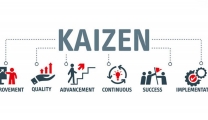I. Overview: What is Employee Management?
Employee management is a combination of human resource strategies and policies to exploit and use the human resources of an organization or a company in a reasonable and effective way. It includes the following activities:
- Selection: Recruit candidates who not only have the expertise and experience to get the job done, but also have the necessary characteristics to develop and maintain good relationships with clients and colleagues.
- Monitor and measure: Track and evaluate each employee's performance, or performance management, and devise a plan to improve performance if work or behavior is not working.
- Interact: Communicate goals, work expectations, and feedback to employees. Also, listen to and absorb the ideas of your employees.
- Reward: This is an important step to motivate employees, while maintaining good work performance.
- Discipline: rely on factual reports to develop policies that improve poor performance, including verbal or written warnings, discontinuation of certain external benefits, removal, suspension, termination, and termination decommissioning or even legal action.
II. The benefits of managing subordinates effectively
Employees are critical to the success of an organization. When you know how to properly manage subordinates, your business will reap significant benefits, including:
- Improve business productivity
- Increase employee motivation
- Reduce employee turnover rate
Every leader has a leadership style that shows his or her own views, but at the same time needs to have the most effective ways to manage employees.

III. How to effectively manage subordinates?
Below, we'll bring to you some bottom management best practices that leaders can use to get the most out of their employees' abilities and experience, and achieve goals. larger goals of the organization.
1. Reasonable division of work for each person
Every employee has certain strengths and limitations. To be able to coordinate and work most effectively, managers need to be observant to detect the strengths of each employee and promote them.
Besides, the use of job assignment software also helps managers save time and effort, minimize conflicts and conflicts between employees.
2. Set clear expectations
Employees don't know that it's not enough to expect them to do a good job or succeed. You need to make it clear to them what specific criteria you expect from their position.
To do that, set specific expectations for employees right from the start: Meet face-to-face with new employees to discuss company policies, job descriptions, and expectations. specific (hours worked, work quality, sales goals, etc.) This way, employees know exactly what needs to be done and contribute to the organization.
3. Regularly check and monitor work progress
After assigning work, to ensure the progress of work completion as well as to ensure that employees do not neglect or exceed their authority, the leader also needs to closely inspect the results of the assigned work.
This is a way to help employees proactively work on time, without delay, without delay. Building good habits will also help with larger company projects.
4. Evaluation and orientation of employees' capacity
In addition to assigning tasks and checking results, managers also need to evaluate the capacity and working attitude of their subordinates. Evaluation sessions should be held periodically quarterly, annually, etc. After that, the manager will synthesize and base on multi-dimensional and objective evaluations of employees to make a decision to reward or criticize.
To be able to make "standard" and non-emotional assessments, companies need to develop a set of standard performance evaluation criteria for each individual/department. At the same time, the use of work management tools also makes the evaluation process more efficient and accurate.
5. Reward employees appropriately
According to research by O.C. Tanner Institute, 78% of employees say that they will be more attached to the business when they receive recognition for their worthy achievements from their superiors.
Therefore, having a reasonable reward plan is a practical activity that helps you make a good impression on employees, show interest, appreciate their efforts and recognize their efforts. From there, employees will have more motivation and sense of responsibility to work for the company.
6. Build a friendly and fun working environment
One of the ways to effectively manage subordinates that many companies want to achieve is to create a friendly, dynamic but competitive working environment. When working in a positive environment, employees will become happy, comfortable and tend to be more active and perform better. On the contrary, when working in a negative environment, employees will feel depressed, tired, lose motivation to work and have the ability to quit to find a better working environment.
7. Employee Empowerment
Any employee wants to be respected and empowered. Especially at work, managers should allow employees to participate in the management process, make decisions and take responsibility, and listen to employees' opinions. When you empower employees, the leader will reduce the work for the leader, and at the same time, it is also an opportunity for employees to show their capacity, learn more new skills for comprehensive development.
8. Engage employees with the company's common goals
The best way for team members to work together is to orient them to work for a common purpose. If every employee only focuses on their personal goals, it can easily lead to self-isolation, disengagement and lack of cooperation. According to research, goals are easy to achieve if all employees are focused on a common goal.
IV. Steps to deal with “negative” members of the group
Surely all of us have encountered this type of employee – someone who is always in a bad mood, works poorly and is difficult to teamwork. They say no to everything and their pessimism also more or less affects the morale of others.
So how can you handle this case skillfully and professionally? Here are the sharing of experts on how to manage negative subordinates.
1. Seen from a manager's perspective
Before making any judgments, take some time to think about who this person is, what is it about them that makes them so negative. Don't just judge based on feelings or one-sided opinions from a few of their colleagues, but quickly conclude that this person is doing a very negative job. Get input from a variety of sources combined with your own observations and opinions as a manager.
2. Information gathering
Think about how the person's negativity manifests. Where and in what context do they tend to act negatively? Are you witnessing the behavior first-hand or is it feedback from other employees?
If the feedback comes from the employee's co-workers, take the time to talk and listen to their point of view — without asking them to speak badly or negatively about their co-workers, of course. You can use an approach like: “I just want to check to make sure everyone is working well together. Are there any issues with the team that you would like to address? Or how can I help as your manager?”
If you witnessed the employee's negative behavior first-hand, keep in mind details like where, when, and how negative it happened. For example, if they consistently dismiss other people's ideas during a meeting, notice when it happened and what they said, their attitude, and how they acted.
Ending
Human resource management is always a necessary skill that any manager needs to hone and learn constantly. A good working environment with a team of professional staff in working attitude and skills will help the business constantly develop and be a bright spot to attract many talents. Besides, the use of employee management software also makes managing subordinates much easier.












Replies to This Discussion